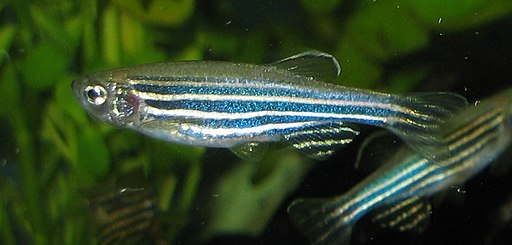Tiny transparent fish share many human characteristics; could help find compounds preventing spread of pancreatic tumors

For more than a decade, a glassy striped fish smaller than a door key has proved an important model organism in scientific research. Named for the uniform horizontal stripes on the side of its body, the zebrafish is a tiny creature that packs a punch in terms of biological similarities with the human.
Today, scientists at the Translational Genomics Research Institute (TGen) are using zebrafish to accelerate investigations of pancreatic cancer, the nation’s fourth-leading cause of cancer-related death.
TGen researchers believe the zebrafish can aid in the search for therapeutics that could help slow down, and even reverse, the growth and spread of cancer in pancreatic cancer patients.
Amazingly, this tiny fish shares about 70 percent of the genetic code of humans, has genetic similarities for the overwhelming majority of genes that cause human disease, grows to maturity in a matter of weeks, and are relatively inexpensive to manage.
Importantly, because of their transparent scales, they can provide a window into the real-time development of cancer tumors.
“With a microscope, you can see what is wrong without having to dissect it,” said Dr. Haiyong Han, a TGen Associate Professor, head of TGen’s Pancreatic Cancer Research Unit. “You can see the tumor just by looking into the fish.”
Zebrafish are vertebrates, so they have organs similar to people, including a pancreas, an organ near the stomach that produces digestive juices and several key hormones.
Genes are responsible for creating proteins. An altered gene disrupts the associated proteins, including those that lead to cancer. By studying altered genes in zebrafish, TGen researchers can monitor the initiation, growth and fatal effects of pancreatic tumors, including their spread to other organs.
Even though they are small, zebrafish are relatively complex organisms, allowing researchers to use them to mimic problems, and solutions, in people. And because zebrafish achieve maturity within about 3 months, researchers can compress the time otherwise needed to study tumor development.
“Where it would take months or years in a human, it only takes days or weeks to see the tumor growth in zebrafish,” said Dr. Daniel D. Von Hoff, TGen’s Distinguished Professor and Physician-In-Chief. “This is going to be of tremendous benefit for our scientific investigations, and ultimately for our patients.”
Care of the zebrafish is overseen by an Institutional Animal Care and Use Committee, or IACUC, which reviews all testing procedures and ensures the humane treatment of the fish throughout their lifecycle.
This year, nearly 49,000 Americans will be diagnosed with pancreatic cancer, and more than 40,000 will die from this disease. Median survival for patients with advanced disease is less than 6 months following diagnosis, and the 5-year survival rate is less than 6 percent for all patients. Pancreatic cancer’s lethal nature stems from its propensity to rapidly spread to distant organs. Because there is no early screening test, it usually is not diagnosed until its late stages, often when surgery is no longer an option, making it difficult to treat.
Dr. Han will monitor the growth and dissemination of tumors in the zebrafish and, specifically, look at the epithelial–mesenchymal transition (EMT), in which epithelial cells gain migratory and invasive characteristics.
This should help TGen investigators to better understand how pancreatic cancer invades local tissue, causing pain, and how it spreads to other organs — especially to the liver and lungs — which often is the actual cause of death in pancreatic cancer patients.
And because of low costs associated with maintaining zebrafish, investigators can conduct multiple studies in relatively short periods of time.
TGen’s zebrafish project is funded by the Seena Magowitz Foundation.
# # #
About TGen
Translational Genomics Research Institute (TGen) is a Phoenix, Arizona-based non-profit organization dedicated to conducting groundbreaking research with life changing results. TGen is focused on helping patients with cancer, neurological disorders and diabetes, through cutting edge translational research (the process of rapidly moving research towards patient benefit). TGen physicians and scientists work to unravel the genetic components of both common and rare complex diseases in adults and children. Working with collaborators in the scientific and medical communities literally worldwide, TGen makes a substantial contribution to help our patients through efficiency and effectiveness of the translational process. For more information, visit: www.tgen.org.
Press Contact:
Steve Yozwiak
TGen Senior Science Writer
602-343-8704
syozwiak@tgen.org


